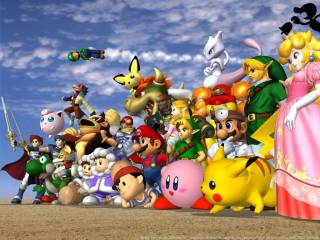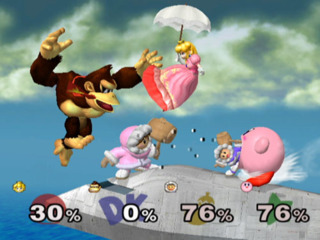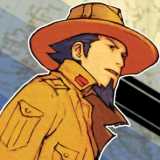Gaming Memories: Super Smash Bros. Melee
By majormitch 0 Comments
Welcome to “Gaming Memories,” a blog series where I reminisce about my favorite video games. I will slowly but surely get to every game on the list, and speak to why each holds a special place in my heart. That not only means I’ll talk about why I think each is a great game that speaks to my tastes, but also where and how it affected me in a larger context. I hope you enjoy, and thanks for reading.
So, what if, Mario and Link fought each other? Who would win? Mario can jump super high and shoot fireballs out of his hands, while Link has all sorts of tools like a bow and arrow, a boomerang, bombs, and a sword. It’s easy to imagine them bouncing around, dodging each other, trying to figure out how to land that critical blow. They are both crafty characters too, so it would be a tactical fight as much as a physical one. But maybe we’ll never know who would win. Nintendo would surely never answer the question themselves, nor make a crossover game where they fight each other. Or would they?

Fans of video games, movies, TV shows, comics, etc., love to toss around these kinds of hypothetical showdowns between their favorite characters from different properties, and debate who would win. In 1999, Nintendo capitalized on the idea when they released the original Super Smash Bros. for the Nintendo 64. Part fighting game, part party game, part pure fan service, and part self-tribute, it was a rare successful mashup; not many video game companies had the breadth of popular properties or the licensing clout to pull off such a game at that time. And when they did, such as Marvel vs. Capcom, they almost never stuck solely to video game characters. Nintendo, however, was unique. They had created numerous successful and influential games in a relatively short time span, which bred a surprisingly large stable of their own iconic video game characters. The likes of Mario, Link, Donkey Kong, Samus, Kirby, and more were already established, highly recognizable, and well-loved characters by 1999. Super Smash Bros. tossed them all together, and let players fight it out among them. It was totally weird and unexpected. And it was totally awesome.
But it also wasn’t perfect: the controls were rough, the roster was limited, and the technology of the Nintendo 64 seemed to hold it back. Fortunately for Nintendo, their next console, the GameCube, debuted two short years later. With it came a sequel in Super Smash Bros. Melee, and those two years and new hardware made a world of difference. The original Super Smash Bros. remains one of my most nostalgic gaming experiences; there was a magic to seeing all of those beloved characters duking it out in the same game for the first time. As a Nintendo kid, I obsessed over Super Smash Bros., and played it endlessly. Yet while it holds a very special place in my heart, it’s impossible to deny how much of a step up Melee was. First and foremost, it was a much bigger game across the board: it boasted double the characters, triple the stages, and a host of exciting new modes such as Adventure mode, All-Star mode, Event challenges, Home-Run Contest, and a slew of Multi-Man minigames. Second, Melee was a huge technical step up from the original. Perhaps not all that surprising given it was on new hardware, but it made a big difference in how the game looked, sounded, and ran (read: much more smoothly). Finally, it was simply a more competent fighting game. The controls, physics, moves, abilities, and so on were more confident and well-considered, and it was here that Super Smash Bros.’s unique brand of fighting really found its footing. Melee was drastically more enjoyable to play in its moment to moment action; there’s a reason it’s still widely played today, in 2019.

Much of this we expect in sequels to successful games, but in the case of Super Smash Bros. Melee, it felt like making good on that tantalizing promise of the original; this felt like Nintendo throwing the party they wanted to throw two years earlier, but couldn’t. But just as important as being bigger and better in its raw execution, Melee retained the heart and energy of its predecessor, that same reverie of all things Nintendo that made it so exciting for fans. In fact, it may have been more tangible than ever. The new characters were more surprising than before, and included both fan favorites (like Bowser, Sheik, and Mewtwo) as well as surprise throwbacks (like Mr. Game & Watch, Ice Climbers, and Marth). Adventure and event modes toyed with Nintendo history in playful ways, while countless collectible trophies contained even more references. Home-run and multi-man modes provided a variety of different challenges, adding a lot to an already robust package. And new, remixed music came from all corners of the Nintendo universe to keep everything lively with a heavy Nintendo vibe. There was a special feeling to those early days of Super Smash Bros., a certain je ne sais quoi that I feel has been lost in the later sequels, even as they’ve continued to add more characters, more stages, and more songs. Super Smash Bros. Melee, then, stands as my personal sweet spot for the franchise: it produced the refinement needed over the original, while retaining a magic I feel its sequels lost.
Super Smash Bros. Melee brought together a large roster of loveably weird Nintendo characters, built a rambunctiously fun fighting game around them, added countless activities around the periphery, and tied it together with boundless heart and personality. It was a broad, joyful celebration of all things Nintendo, and there aren’t many games I’ve spent as much time with as this; it defined countless weekends and late nights for a substantial period of my life. In 2001, Nintendo threw one hell of a party in honor of themselves. It’s one I’ll never forget.
